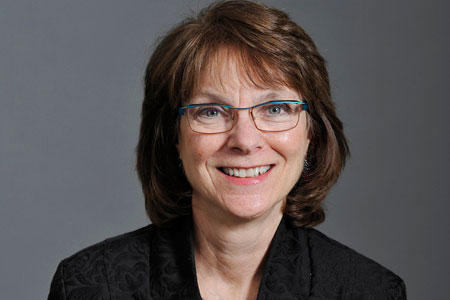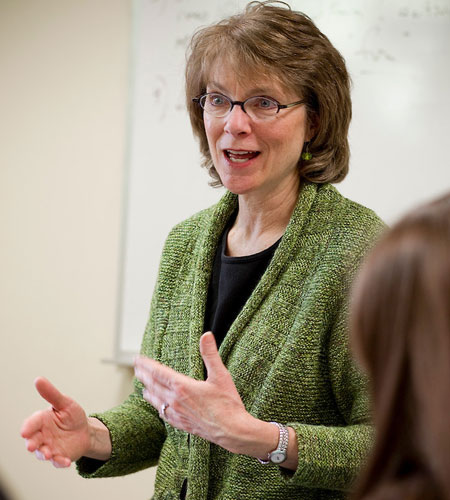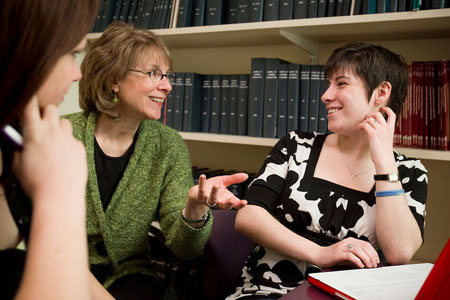Lipschultz leaving Emerson after 31 years
Shelley Lipschultz is saying good-bye to Emerson after working in the Communication Sciences and Disorders Department for more than 30 years, most recently as clinical instructor and undergraduate coordinator.
A faculty member since 1982, Lipschultz is retiring January 3 and moving part-time to England with her husband, Bruce Lipschultz, who is leaving his position as a physicist at the Massachusetts Institute of Technology, where he has worked for 33 years, for a new position at the University of York.

“It’s been a challenge for us both to say good-bye to colleagues in settings we’ve enjoyed for so long,” Shelley Lipschultz said. “A lot of us have been together for a very long time, and we’re much more than workmates. We’re really good friends and care deeply about each other.”
CSD colleagues hosted a going-away party for Lipschultz at the home of Sandra Cohn Thau, director of clinical education, whom Lipschultz called her “closest buddy for almost 30 years.”
“CSD threw me a party on [a recent] Saturday night that was just overwhelming,” Lipschultz said. “There were a lot of laughs and a lot of tears. It’s very bittersweet.”
Lipschultz, a mother of two adult sons, is still figuring out what to do next. However, she will continue her volunteer work, sing in a choir, and “spend a lot of time on Skype.”
“I may look for work opportunities in my field, but I may reinvent myself in a totally new way that I haven’t figured out yet,” she said.

Lipschultz, who lives in Brookline, said her career began more than three decades ago after she was approached about a position by former Emerson President Jackie Liebergott, who was a faculty member in CSD at the time.
Lipschultz spent much of her Emerson career working out of the former CSD location on Beacon Street.
“I have a lot of memories of working in that clinic under less-than-ideal conditions,” she said. “We had an elevator with a wrought-iron gate that you had to pull closed. I remember having to schlep cameras and tripods up and down that old-fashioned elevator to record therapy sessions behind one-way mirrors.”
CSD, which trains students to become speech pathologists, among other professions related to speech disorders, continues to be the smallest academic department at Emerson. But it was even smaller when Lipschultz started, with fewer than 50 undergraduate students majoring in CSD, compared to about 80 now. There were about 25 graduate students in the early 1980s, compared to about 90 this year.
“Even though the program has grown in numbers, we haven’t sacrificed the ability to provide a really good quality educational experience for students, and I think that’s huge,” she said. “That’s in large part because the College has been generous in giving us resources.”

CSD studies and provides assistance to children with autism or born with hearing impairments, as well as adults who have had strokes or traumatic brain injuries, among other types of clients.
Lipschultz said she is most proud of the growth of the undergraduate program during her tenure, as well as her development of an online course about three years ago.
“It’s very surreal to me,” she said about leaving Emerson. “It’s really exciting. But now as the date approaches, the sadness has settled in. I’m optimistic the excitement will come back because there is a whole new world out there to explore.”
Lipschultz said she would like to publicly thank several current and former CSD faculty members for their friendship and continued support, including Liebergott, Betsy Micucci, David Luterman, Dorothy Aram, Charlie Klim, Dan Kempler, Wyatt Oswald, and Peg Lahey. “I’ve learned so much from them and others,” she said.
Lipschultz also said she can still be contacted through her Emerson email address after January 3: shelley_lipschultz@emerson.edu
Categories